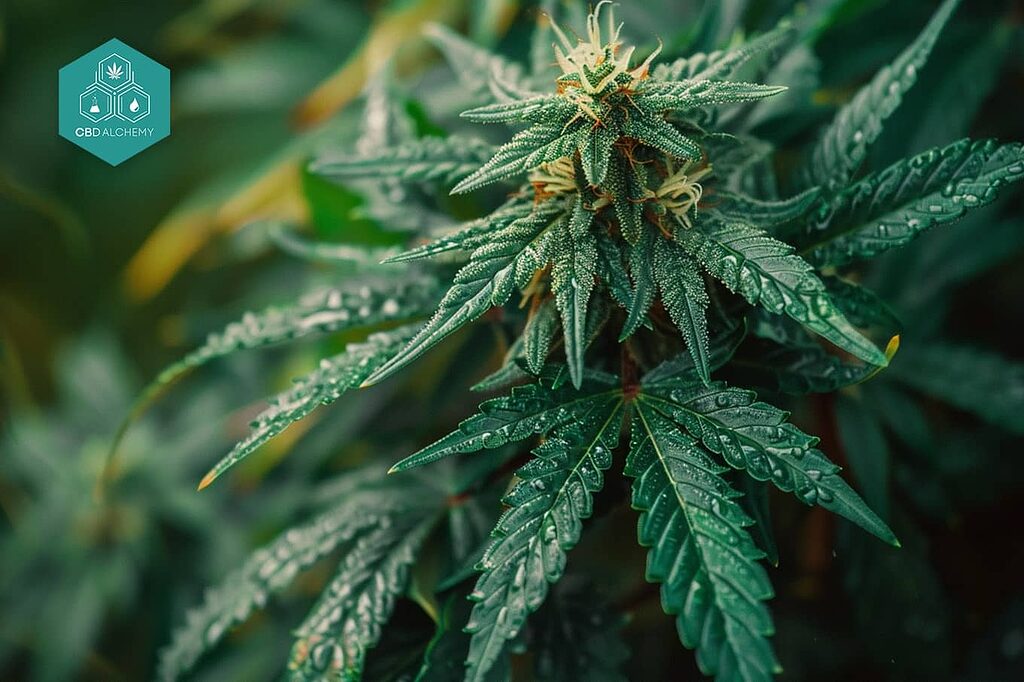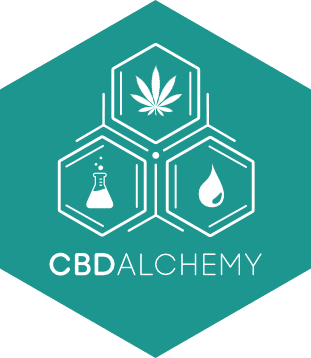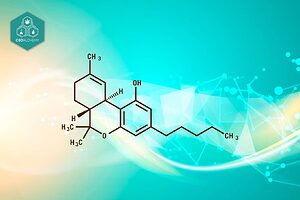What are the side effects of cannabidiol (CBD)? Here we explain the most common adverse effects and potential risks of CBD use, including cannabidiol side effects to be aware of.
Key Points
- Cannabidiol (CBD) is a non-psychoactive compound in cannabis, with therapeutic properties and no euphoric effects, making it legal in many regions.
- Common side effects of CBD include dry mouth, fatigue, and appetite changes, and their occurrence can depend on dosage and individual sensitivity.
- The use of CBD presents potential risks, such as interactions with other medications, so it is recommended to consult a physician before initiating its use. In some regions, the use of CBD products requires a medical prescription to ensure proper use and minimize risks.
What is Cannabidiol (CBD)?

Cannabidiol, or CBD, is a non-psychoactive compound extracted from the cannabis sativa plant. Unlike tetrahydrocannabinol (THC), CBD does not produce the euphoric effects associated with marijuana. This has made it an attractive option for those seeking the therapeutic benefits of cannabis without the “high”.
CBD is specifically sourced from the cannabis sativa plant, the same plant that produces marijuana and hemp. While marijuana contains high levels of THC, hemp has minimal levels of this compound, allowing CBD to be extracted without psychoactive effects. This difference is crucial to understanding why CBD is legal in many places where marijuana is not.
In addition to CBD and THC, the cannabis plant contains more than 80 different cannabinoids. Each of these cannabinoids has unique properties and can interact with the body in different ways. However, CBD has been the focus of most research due to its wide range of therapeutic applications and favorable safety profile.
Medical Benefits of CBD
Cannabidiol (CBD) is a naturally occurring compound found in the cannabis plant and has been shown to have a wide range of medical benefits. Below are some of the most prominent benefits of CBD:
Top CBD Side Effects

Although CBD is generally well tolerated, it can cause side effects in some people. When applied to the skin, some people may experience skin sensitivity or mild allergic reactions. These side effects can range from mild to moderate, and their occurrence can depend on factors such as dosage and individual sensitivity.
The most common side effects include dry mouth, fatigue, drowsiness and changes in appetite. Below, we will explore each of these effects in detail.
Dry Mouth
Dry mouth is one of the most common side effects associated with CBD use. This phenomenon occurs because CBD can reduce saliva production, which leaves the mouth dry and sometimes uncomfortable. While not a serious effect, it can be bothersome for some users.
To mitigate dry mouth, it is advisable to stay well hydrated. Drinking water frequently can help alleviate this symptom and make the CBD experience more enjoyable. It is also helpful to keep this effect in mind if using CBD in situations where hydration is crucial, such as during physical exercise.
Fatigue and Drowsiness
CBD can cause fatigue and drowsiness, especially when consumed in high doses. For some people, these effects can be beneficial, as they can improve sleep quality and provide deeper rest. This is particularly helpful for those who suffer from insomnia or sleep disorders.
However, fatigue and drowsiness can be problematic for those who need to stay alert during the day. For example, these effects can interfere with daily activities, such as work or driving. Therefore, it is crucial to find the right dosage that provides the desired benefits without causing excessive drowsiness.
The amount of CBD consumed can significantly influence the occurrence of these effects. It is advisable to start with a low dose and gradually increase until the perfect balance is found for each individual. In this way, side effects can be minimized while maximizing the benefits of CBD.
Appetite Changes
CBD consumption can lead to changes in appetite. Depending on the individual and the dosage, these changes can manifest as an increase or decrease in appetite. Some users report feeling hungrier after consuming CBD, while others experience a reduction in their desire to eat.
These changes in appetite can be beneficial or problematic, depending on personal circumstances. For example, increased appetite may be helpful for those who need to gain weight, while decreased appetite may be advantageous for those seeking to control their caloric intake.
It is important to monitor these effects and adjust the CBD dosage as needed to achieve the desired goals.
Potential Risks of CBD Use

Despite its many benefits, CBD use is not without risks. It is critical to consider these risks before beginning CBD use, especially if you have pre-existing medical conditions or are taking other medications. Potential risks include drug interactions and possible liver problems. In addition, cannabidiol has been approved to control seizures associated with Lennox-Gastaut syndrome, a severe form of epilepsy resistant to conventional medications.
Below, we will detail these risks so you can make informed decisions.
Drug Interactions
CBD can alter the metabolism of other medications, which can intensify or diminish their effects. For example, using CBD along with sedatives can increase drowsiness, which could be dangerous in certain situations. For this reason, it is crucial to consult a doctor before starting to use CBD if you are taking other medications.
In addition, some substances present in medications can interact negatively with CBD medication, which could cause unwanted side effects. Consultation with a healthcare professional can help identify possible interactions and adjust dosages to minimize risks.
Possible Liver Problems
CBD use may pose a risk for people with pre-existing medical conditions, especially liver disease. CBD may interact with other medications by altering their metabolism in the liver, which could aggravate existing liver problems. Therefore, it is essential to talk to a doctor before using CBD if you have a liver condition.
Animal studies have shown that high doses of CBD can cause liver damage. While these results do not always translate directly to humans, they underscore the importance of caution and medical supervision when using CBD, especially in high doses.
Product Safety and Quality

The safety and quality of CBD products can vary significantly. Some products may not contain the amount of CBD indicated on the label, or may be contaminated with unwanted substances. Therefore, it is crucial to choose products that are of high quality and manufactured with safe practices.
Below, we will explore the importance of lab testing and how to select a safe CBD product.
Importance of Laboratory Testing
Tests conducted by independent laboratories are essential to ensure the purity and concentration of CBD in products. These tests ensure that products are free of contaminants and contain the correct dosage of CBD, which is crucial to their safety and effectiveness.
A certificate of analysis (COA) is a document that provides details about the chemical composition and potency of cannabis products. This certificate ensures that the product has been tested and meets quality standards, offering peace of mind to the consumer.
How to Choose a Safe CBD Product
When selecting a CBD product, it is critical to consider the following aspects:
- Oil Spectrum: Full-spectrum products may offer additional benefits due to cannabinoid interaction.
- CBD concentration: Verifying the amount of CBD in the product is crucial to understanding its potency.
- Manufacturer transparency: Make sure the manufacturer provides clear information about the tests performed on their products.
These factors will help you make an informed decision when choosing a CBD product.
Summary
CBD offers a wide range of potential benefits, but it is vital to be aware of its side effects and risks. From dry mouth to potential liver problems, understanding these issues can help you make informed decisions about its use. In addition, the safety and quality of CBD products are critical to ensuring a positive and safe experience.
Ultimately, the key to reaping the benefits of CBD safely is education and caution. Consulting with health professionals, choosing high-quality products and being informed about potential side effects and risks will allow you to enjoy the benefits of CBD with peace of mind.
Frequently Asked Questions
What side effects can CBD have?
CBD can have side effects such as dry mouth, fatigue, drowsiness and changes in appetite. It is important to be aware of these reactions when consuming it.
Does CBD interact with other medications?
Yes, CBD can interact with other medications, altering their metabolism and therefore increasing or decreasing their effects. It is important to consult a doctor before combining it with other treatments.
Is it safe to use CBD if I have liver problems?
The use of CBD is not recommended for people with liver problems due to the possible associated risks. It is imperative to consult a physician before considering its use.
References
- Iffland, K., & Grotenhermen, F. (2017). An Update on Safety and Side Effects of Cannabidiol: A Review of Clinical Data and Relevant Animal Studies. Cannabis and Cannabinoid Research, 2(1), 139-154.
This comprehensive review examines the safety and side effects of CBD, concluding that it is generally well tolerated with a favorable safety profile.
https://www.ncbi.nlm.nih.gov/pmc/articles/PMC5569602/
- Brown, J. D., & Winterstein, A. G. (2019). Potential Adverse Drug Events and Drug-Drug Interactions with Medical and Consumer Cannabidiol (CBD) Use. Journal of Clinical Medicine, 8(7), 989.
This study discusses potential interactions between CBD and other medications, highlighting the importance of medical supervision.
https://www.ncbi.nlm.nih.gov/pmc/articles/PMC6678684/
- Millar, S. A., et al. (2019). A Systematic Review of Cannabidiol Dosing in Clinical Populations. British Journal of Clinical Pharmacology, 85(9), 1888-1900.
This systematic review examines CBD dosing in different clinical populations, providing valuable information on effective and safe doses.
https://bpspubs.onlinelibrary.wiley.com/doi/full/10.1111/bcp.14038
- World Health Organization. (2018). Cannabidiol (CBD) Critical Review Report.
This WHO report provides a critical review of CBD, including its safety and therapeutic potential.
https://www.who.int/medicines/access/controlled-substances/CannabidiolCriticalReview.pdf






